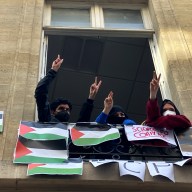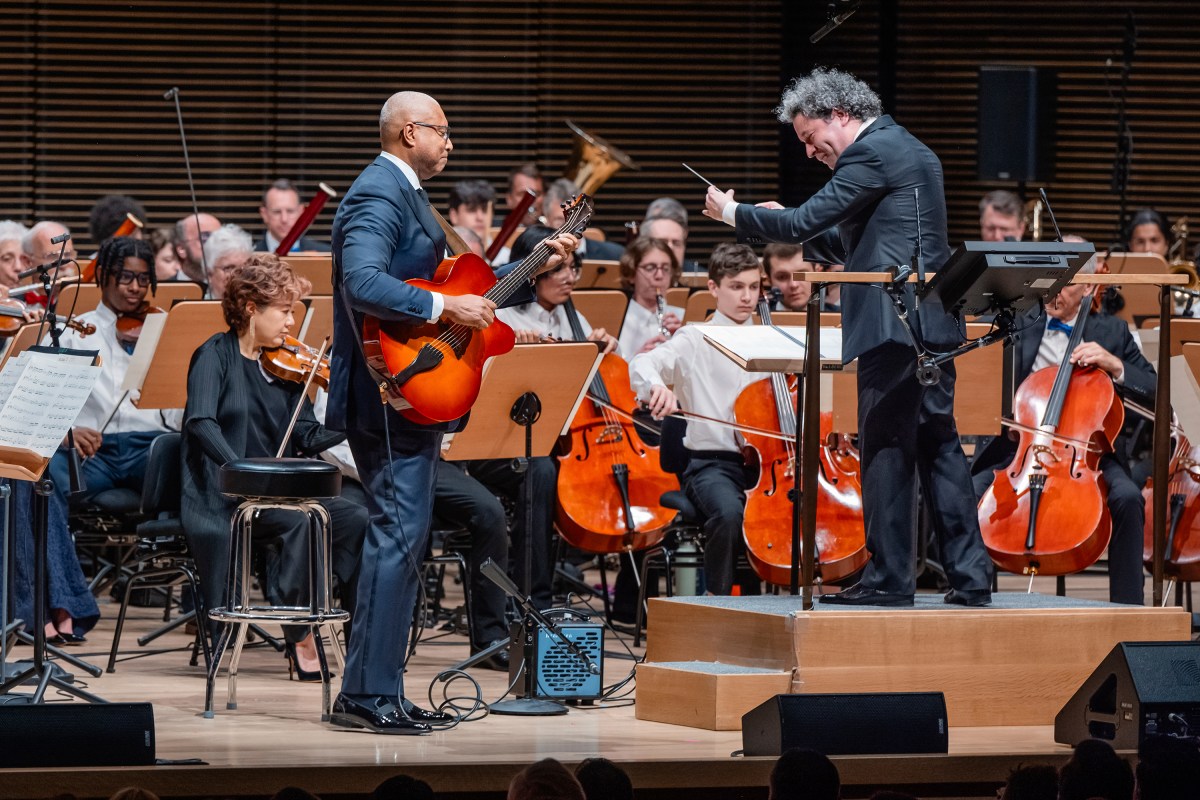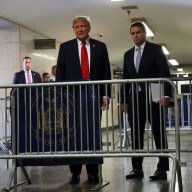 Regine Chassagne and Win Butler are shown here performing during the Reflektor tour.
Regine Chassagne and Win Butler are shown here performing during the Reflektor tour.
Credit: Adam Berry/Getty Images
Arcade Fire excel at that neat little trick of burying a line within a song that in different contexts can be taken either as a universal truth or a lyric about what they are facing as a band. In the latter situation, it’s sort of a dialogue with potential detractors, a survival mechanism of criticizing themselves and their circumstances before the critics can. Their set on Tuesday at the Xfinity Center in Mansfield was rife with these small moments. But when added up, the moments transcended this self-consciousness and became a transformative experience, going from one band concerned about themselves to a wider whole about the human condition.
A sampling of such lines: “First they love you, then they kill you, then they love you again” from the song “Joan of Arc” on their most recent album, “Reflektor”; “Hope that something pure can last” from “We Used to Wait,” off of the band’s 2010 album, “The Suburbs” or a longer sampling like “It seems so important now, but you will get over, and when you get over, when you get older then you will remember why it was so important then” from “It’s Never Over (Oh Orpheus)” also from “Reflektor.”
Those lines could so be about the band! Right? And they performed all of the songs in question on Tuesday night, with these individual lines seeming a little more resonant than most.
This is a band who in their 10th year are still experiencing growing pains with where they stand with their art and how it’s received. They are constantly questioning — as they began doing more deeply on “The Suburbs” — if they were “moving past the feeling.”
This is definitely a good thing. When artists continue to ask themselves these questions, you’re less likely to see somebody phoning it in on the stage. They’re wondering if they still hold the same beliefs that when first expressed earned them such acclaim. And as is often the case with an artist asking these questions, the setlist is dominated by work from the most recent album, with additional selections carefully culled from their back catalogues, making sure that each old track that’s dusted off passes the belief test.
Out of the 20 songs the band played, almost half of the set was comprised of songs from the latest album. But the peculiar thing is that whereas many bands seem to play the new stuff as a way to sell their latest album (and many fans seem to see the new stuff as a way to take a bathroom or beer break without missing anything) the order of the setlist sort of turned this concept on its head.
By the time the band got to the title track of their latest effort, they were more than halfway through the set, and this was only their third song from the latest album. And what’s even stranger, is the opening bars of the song — the closest Arcade Fire has ever come to a dance song — drew immediate applause of recognition from the crowd. And then a feeling which doesn’t happen very often at big outdoor summer concerts took hold: Could it be that we the audience wanted to hear more of the new stuff!?
It’s really the opposite of “Shut up and play the hits,” a line that Arcade Fire singer Win Butler says in the LCD Soundsystem movie that gives the film its title.
By frontloading the set with “the hits,” the crowd was clamoring for the deep cuts halfway through. And that’s when the band really delivered.
What’s also peculiar about the set is that it was dominated by songs that deal in the theme of mortality and questioning institutionalized spirituality, which have always been present in Arcade Fire songs, but whereas in the past they have worn their hearts on their sleeves in delivering what could be considered anthems for cynics, this time they were just having a ball. It’s kind of like the Mr. Boffo comic where in the first frame it says “Three guys falling down a bottomless pit” and they’re absolutely terrified, but in the next frame it say “The same three guys six months later” and they’re wayyy more relaxed. (Yes, this is the first time I’ve ever invoked Mr. Boffo in a rock review.)
It’s as if this is the Arcade Fire’s Zoo TV tour. They’ve made their point by being serious. Now it’s time to have fun. The band goofs around with their papier-mâché-headed alter egos (and there’s also a Pope and Barack Obama mask donned onstage too), a man in a mirrorball suit dances in the middle of the crowd during “Aferlife” and confetti cannons fire into the crowd during “Here Comes the Night Time.”
In this celebratory fashion, the band found time to make fun of Boston (both the band and the city) when they pretended to play “More than a Feeling” and to salute the area as well. They praised Partners in Health — the Massachusetts-based charitable organization to which the band have allocated $1 of each ticket sold in the U.S. — as “the greatest thing to come out of Boston since the Pixies.” The band also included the Pixies’ “Alec Eiffel” in their setlist, and Win disclosed that he wrote “Tunnels” “in the Alewife Metro.” We think he meant to say “the Alewife T Station,” but he’s lived in a lot of cities, so we can forgive him for forgetting the local language. Or maybe his association with the Metro newspaper found in the subway was so strong that he just thought we owned all of the train stations.
Yeah, we’ll go with that!
















